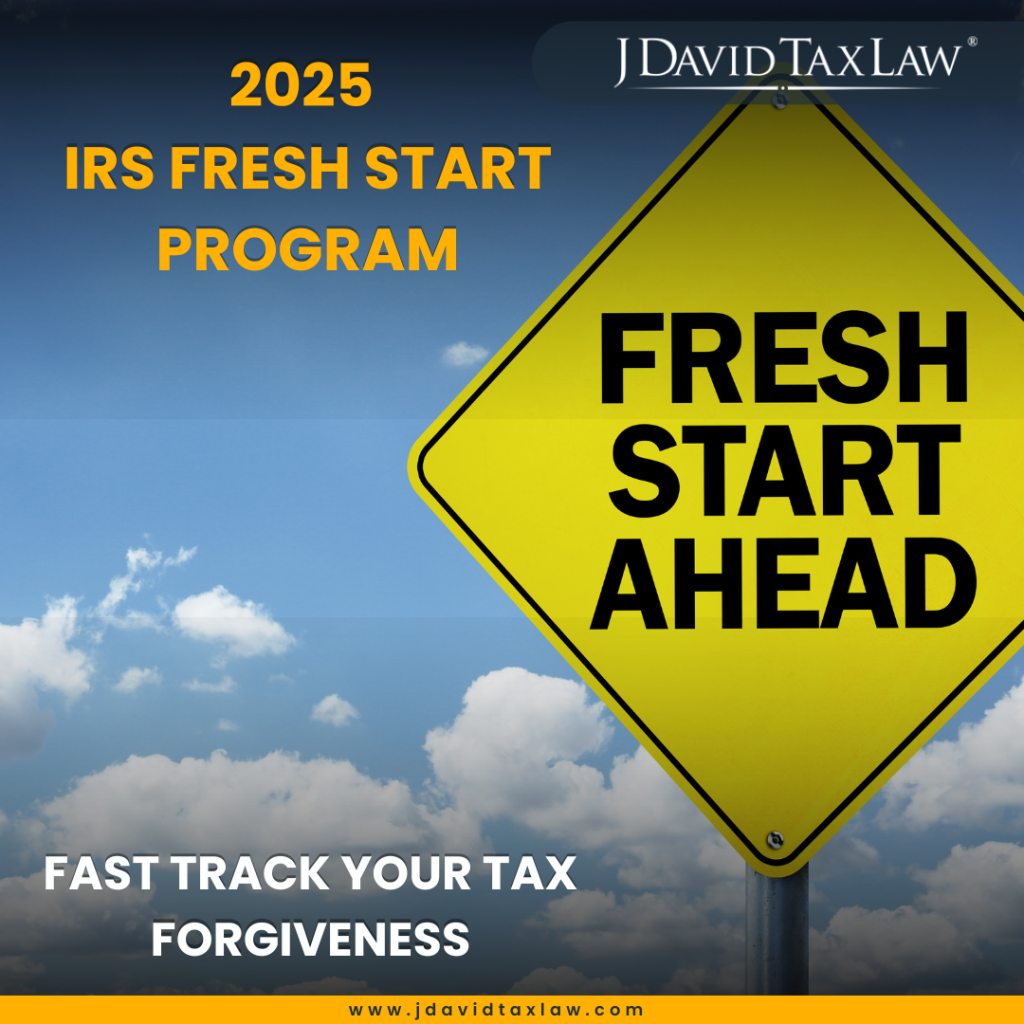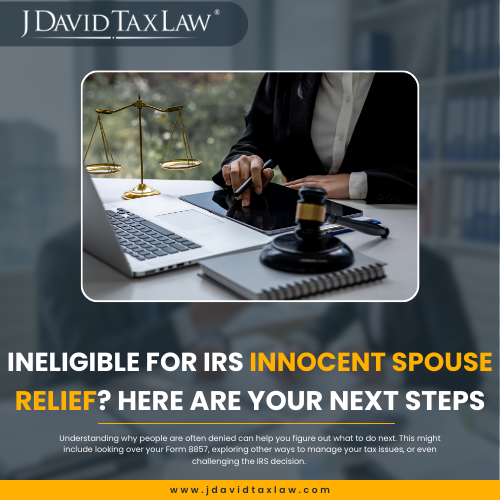Are you facing tax liabilities due to errors on a joint tax return you signed with your spouse? In Fayetteville, North Carolina, innocent spouse relief offers a legal pathway to address such injustices. This relief can protect you if your spouse or former spouse inaccurately reported income, claimed false deductions, or committed other wrongful financial actions without your knowledge.
This article explores the concept of innocent spouse relief, the types available, and how you might qualify. By understanding these options, you can protect yourself from undue tax debts and penalties arising from joint tax liabilities.
At J. David Tax Law, our experienced tax attorneys specialize in helping residents of Fayetteville navigate the complexities of tax law. Partner with us and receive the support you need to resolve these challenging issues effectively.
How Does Innocent Spouse Relief Work?
When you sign a joint tax return, both you and your spouse become jointly responsible for any tax debt. However, if discrepancies arise, such as unreported income or false deductions, and you were unaware of these issues, you might be eligible for relief.
Here’s a detailed look at how this process works:
Understanding the Relief Types
Innocent spouse relief offers three distinct types to address different scenarios of joint tax liabilities. Each type has specific requirements and caters to different situations.
Here’s a closer look at each type:
1. Classic Relief (Traditional Innocent Spouse Relief)
Classic Relief is designed for those who find errors on their joint tax returns that they were unaware of and did not cause. These errors might include unreported income, such as a spouse’s hidden earnings from a side job, or incorrect deductions, such as exaggerated charitable donations.
Eligibility Criteria: You must prove that when you signed the joint return, you had no knowledge of the errors. The IRS also considers whether it would be reasonable for you to have known about the discrepancies.
Benefits: If granted, you are relieved of the tax debt, interest, and penalties related to the errors.
2. Relief by Separation of Liability
Relief by Separation of Liability allows you to separate the tax liabilities on your joint return that were incorrect due to your spouse’s actions. This type is particularly useful for individuals who are divorced or legally separated.
Eligibility Criteria: You must be divorced, legally separated, or have been living apart from your spouse for at least 12 months. Proof that the errors were solely attributable to your former spouse is necessary.
Benefits: This relief divides the tax owed, allowing you to only be responsible for the portion that you legitimately owe, rather than the entire amount due on the joint return.
3. Equitable Relief
When you do not qualify for either of the first two types of relief, you may consider Equitable Relief. This option applies to both understated and underpaid taxes on a joint return.
Eligibility Criteria: You may qualify if you can demonstrate that, given all the facts and circumstances, it would be unfair to hold you liable for the tax understatement or underpayment. Factors considered include whether you received significant benefits from the unpaid tax, your financial situation and whether you’ve been subject to abuse by your spouse that prevented you from questioning the items on the return.
Benefits: Equitable relief can cover a wider range of issues and typically involves a case-by-case assessment by the IRS, offering a flexible approach to resolving tax liability issues.
Qualifying for Innocent Spouse Relief
To qualify for any type of innocent spouse relief, applicants must meet specific criteria set by the IRS. These criteria are designed to ensure that relief is granted only to those truly unaware of or uninvolved in the filing errors.
Here’s a more detailed look at the qualifications for relief:
Eligibility Requirements
Joint Return: You must have filed a joint tax return with the discrepancies resulting from your spouse’s or ex-spouse’s errors.
Error Types: The discrepancies can involve unreported income (income not reported on the joint tax return), incorrect deductions, credits incorrectly claimed, or incorrect reporting of income. The error must have resulted in a substantial understatement of the tax liability (the amount owed is more than was shown on the return).
Ignorance of the Error: At the time you signed the joint return, you must not have known, and had no reason to know, that there was an error. The IRS considers whether a reasonable person in similar circumstances would have been aware of the error.
Unfair to Hold Liable: It must be unfair to hold you liable for the understatement of tax. This involves consideration of all facts and circumstances. Factors the IRS may consider include:
Whether you received a significant benefit (beyond normal support) from the understatement.
Whether you have been deserted by your spouse.
Whether you and your spouse have been divorced or separated.
Whether you received a benefit on the tax return from the understatement.
Additional Considerations
Type of Relief: Depending on the type of relief you’re seeking (Classic, Separation, or Equitable), additional specific criteria may apply. For example, for Relief by Separation of Liability, you must be divorced, legally separated, or have been living apart from your spouse for at least 12 months at the time you apply for relief.
Abuse Factor: In cases of equitable relief, if you were a victim of spousal abuse and it affected your ability to question the items on the return due to fear of retaliation, this factor might play a crucial role in your qualification.
Economic Hardship: The IRS also considers whether denying the relief would cause you economic hardship, meaning that paying the tax would prevent you from meeting basic living expenses.
Documentation and Evidence
To support your claim for innocent spouse relief, you should gather and provide as much documentation as possible, including:
Financial documents showing your income and expenses at the time the tax return was filed.
Divorce decrees or separation agreements, if applicable.
Correspondence indicating your lack of awareness of the financial matters handled by your spouse.
Any relevant documentation related to spousal abuse, if applicable.
Application Process
To apply for relief, you need to file Form 8857, Request for Innocent Spouse Relief. You should file as soon as you become aware of a tax liability that might qualify for relief. The IRS will then review your application, considering all factors involved, and determine if you qualify.
What Happens Next?
After submitting your application, the IRS will contact you and may request additional information. They will also inform your spouse or former spouse that you have applied for this relief, giving them a chance to provide information on their behalf.
If the IRS approves your application, you will be relieved of the tax debt related to your spouse’s errors. If denied, you have the right to appeal the decision.
What Innocent Spouse Relief Does for Fayetteville Taxpayers
Innocent spouse relief offers protection from being held liable for tax debt, including additional taxes, penalties, and interest related to joint tax returns. It’s designed for married taxpayers who signed a joint return not knowing it contained errors or fraudulent information. This relief can apply to a wide variety of discrepancies including unreported income, inflated deductions, or improper credits.
By applying for innocent spouse relief, eligible individuals in Fayetteville, North Carolina can shield themselves from unjust tax liabilities arising from joint state income tax issues. These might include negligence penalties or late payment penalties originally triggered by their spouse’s actions. Additionally, this relief can prevent severe collection actions such as asset seizure or garnishment initiated by the IRS.
Need Help?
Innocent spouse relief provides a vital opportunity for married couples in Fayetteville to address unfair tax burdens caused by errors on joint tax returns. Understanding your rights and the available relief options can make a significant difference in resolving these complex tax issues.
If you believe you qualify for this type of relief or have any questions about your tax situation, J. David Tax Law is here to help. Our experienced tax attorneys are dedicated to supporting Fayetteville residents through expert legal guidance, ensuring you receive the fair treatment you deserve under the law. Don’t navigate these challenging waters alone—contact us today to see how we can assist you in achieving a just resolution to your tax liabilities.





















